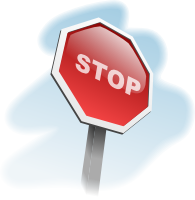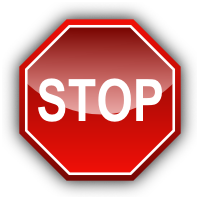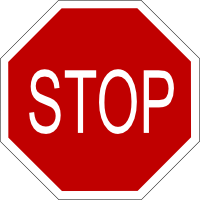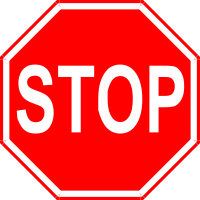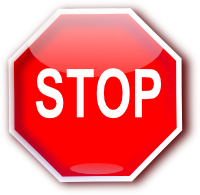Associations to the word «Stop»
Noun
- Bleeding
- Referee
- Brake
- Coachman
- Injunction
- Elevator
- Stagecoach
- Tram
- Pit
- Amtrak
- Bus
- Consonant
- Hurting
- Schumacher
- Commuter
- Train
- Restart
- Articulation
- Timetable
- Streetcar
- Phoneme
- Carriage
- Trolley
- Tyre
- Vowel
- Subway
- Lap
- Beating
- Massa
- Wasting
- Throttle
- Speeding
- Sudden
- Animation
- Slowing
- Gesture
- Staring
- Pace
- Piracy
- Greyhound
- Truck
- Whistle
- Breath
- Septum
- Motion
- Instant
- Transit
- Halt
Adjective
Pictures for the word «Stop»
Wiktionary
STOP, verb. (intransitive) To cease moving.
STOP, verb. (intransitive) To come to an end.
STOP, verb. (transitive) To cause (something) to cease moving or progressing.
STOP, verb. (transitive) To cause (something) to come to an end.
STOP, verb. (transitive) To close or block an opening.
STOP, verb. (transitive) (intransitive) (photography) (often with "up" or "down") To adjust the aperture of a camera lens.
STOP, verb. (intransitive) To stay; to spend a short time; to reside temporarily.
STOP, verb. (intransitive) To tarry.
STOP, verb. (music) To regulate the sounds of (musical strings, etc.) by pressing them against the fingerboard with the finger, or otherwise shortening the vibrating part.
STOP, verb. (obsolete) To punctuate.
STOP, verb. (nautical) To make fast; to stopper.
STOP, noun. A (usually marked) place where line buses, trams or trains halt to let passengers get on and off, usually smaller than a station.
STOP, noun. An action of stopping; interruption of travel.
STOP, noun. A device intended to block the path of a moving object; as, a door stop.
STOP, noun. (linguistics) A consonant sound in which the passage of air through the mouth is temporarily blocked by the lips, tongue, or glottis; a plosive.
STOP, noun. A symbol used for purposes of punctuation and representing a pause or separating clauses, particularly a full stop, comma, colon or semicolon.
STOP, noun. That which stops, impedes, or obstructs; an obstacle; an impediment.
STOP, noun. A function that halts playback or recording in devices such as videocassette and DVD player.
STOP, noun. (by extension) A button that activates the stop function.
STOP, noun. (music) A knob or pin used to regulate the flow of air in an organ.
STOP, noun. (tennis) A very short shot which touches the ground close behind the net and is intended to bounce as little as possible.
STOP, noun. (zoology) The depression in a dog’s face between the skull and the nasal bones.
STOP, noun. (photography) An f-stop.
STOP, noun. (engineering) A device, or piece, as a pin, block, pawl, etc., for arresting or limiting motion, or for determining the position to which another part shall be brought.
STOP, noun. (architecture) A member, plain or moulded, formed of a separate piece and fixed to a jamb, against which a door or window shuts.
STOP, noun. The diaphragm used in optical instruments to cut off the marginal portions of a beam of light passing through lenses.
STOP, adverb. Prone to halting or hesitation.
STOP, interjection. Halt! stop!
STOP, noun. (UK dialectal) A small well-bucket; a milk-pail.
STOP AND FRISK, adjective. Alternative term for stop-and-search
STOP AND SEARCH, adjective. Alternative form of stop-and-search
STOP AND SMELL THE ROSES, verb. (idiomatic) To relax; to take time out of one's busy schedule to enjoy or appreciate the beauty of life.
STOP AT NOTHING, verb. (auxiliary) (idiomatic) To take any measures to do or achieve something, especially if it involves great risk or danger; to do everything in one's power.
STOP BEAD, noun. The moulding screwed to the inner side of a window frame, on the face of the pulley stile, completing the groove in which the inner sash is to slide.
STOP BY, verb. To pay a visit briefly
STOP COCK, noun. Alternative form of stopcock
STOP COCKS, noun. Plural of stop cock
STOP CODON, noun. (biology) (genetics) (biochemistry) a sequence of three RNA nucleotides (A, C, G or U) that instruct the synthesis, or translation, of a protein to stop. The three-letter stop codon sequences have been given names: "UAG" is amber, "UGA" is opal, and "UAA" is ochre.
STOP DEAD, verb. (intransitive) (idiomatic) To stop suddenly.
STOP DOWN, verb. (photography) To decrease the aperture of a photographic lens, moving from an f/stop represented by a lower number to an f/stop represented by a higher number.
STOP LIGHT, noun. Alternative form of stoplight
STOP LIGHTS, noun. Plural of stop light
STOP LIST, noun. (computing) A list of words or other data items which, for some special reason, should be ignored or bypassed by a particular data processing operation.
STOP LIST, noun. (media) A list of people who subscribe to a publication (e.g., newspaper) and no longer wish to receive it.
STOP LISTS, noun. Plural of stop list
STOP LOSS ORDER, noun. (stock market) A conditional order placed with a stockbroker (or similar) to close one's position if the market drops to a specified price level.
STOP LOSS ORDERS, noun. Plural of stop loss order
STOP MOTION, noun. Alternative form of stop-motion
STOP OFF, verb. (intransitive) To make a short visit somewhere, especially on the way to another place.
STOP OFF, verb. (metalworking) To fill (a part of a mould) with sand, where a part of the cavity left by the pattern is not wanted for the casting.
STOP ON A DIME, verb. (intransitive) (idiomatic) (US) To stop dead; stop quickly.
STOP ORDER, noun. Synonym of stop loss order.
STOP ORDERS, noun. Plural of stop order
STOP OVER, verb. (intransitive) To interrupt one's journey for a short (sometimes overnight) stay; to stop off.
STOP PLANK, noun. One of a set of planks employed to form a sort of dam in some hydraulic works.
STOP PRESS, noun. (UK) (journalism) The event or news article important enough to delay or interrupt the print, or require a reprint, of a publication, particularly of a newspaper edition.
STOP PRESS, verb. (UK) Used to announce an event or news article important enough to delay or interrupt the print, or require a reprint, of publication, particularly of a newspaper edition.
STOP PRESS, verb. (idiomatic) (UK) Used to grab attention, implying importance, news-worthiness, etc.
STOP SHORT, verb. To come to a sudden and unexpected stop, particularly while speaking or driving a vehicle.
STOP SHORT, verb. Usually with of, to voluntarily cease an attempt to reach a certain point.
STOP SIGN, noun. A red sign on the side of a street instructing vehicles to stop.
STOP SIGNS, noun. Plural of stop sign
STOP SOMEONE IN HIS TRACKS, verb. (idiomatic) To prevent someone from continuing along a path or way, literal or figurative, he has begun going along.
STOP THE LIGHTS, interjection. (Ireland) (idiomatic) An interjection expressing exasperation or incredulity. or to illustrate the humour in a situation.
STOP THE PRESSES, verb. (idiomatic) An imperative form used to introduce especially new, important, surprising, or recent developments.
STOP TO SMELL THE ROSES, verb. Alternative form of stop and smell the roses
STOP UP, verb. To fill a hole or cavity, or block an opening or passage, as with a plug.
STOP UP, verb. (photography) To increase the aperture of a photographic lens, moving from an f/stop represented by a higher number to an f/stop represented by a lower number and causing more light to pass into the camera.
STOP VALVE, noun. A valve that may be turned to regulate the flow of fluid through a pipe (especially water through a mains supply)
STOP WORD, noun. (computing) a word, usually one of a series in a stop list, that is to be ignored by a search engine etc
STOP WORDS, noun. Plural of stop word
Dictionary definition
STOP, noun. The event of something ending; "it came to a stop at the bottom of the hill".
STOP, noun. The act of stopping something; "the third baseman made some remarkable stops"; "his stoppage of the flow resulted in a flood".
STOP, noun. A brief stay in the course of a journey; "they made a stopover to visit their friends".
STOP, noun. The state of inactivity following an interruption; "the negotiations were in arrest"; "held them in check"; "during the halt he got some lunch"; "the momentary stay enabled him to escape the blow"; "he spent the entire stop in his seat".
STOP, noun. A spot where something halts or pauses; "his next stop is Atlanta".
STOP, noun. A consonant produced by stopping the flow of air at some point and suddenly releasing it; "his stop consonants are too aspirated".
STOP, noun. A punctuation mark (.) placed at the end of a declarative sentence to indicate a full stop or after abbreviations; "in England they call a period a stop".
STOP, noun. (music) a knob on an organ that is pulled to change the sound quality from the organ pipes; "the organist pulled out all the stops".
STOP, noun. A mechanical device in a camera that controls size of aperture of the lens; "the new cameras adjust the diaphragm automatically".
STOP, noun. A restraint that checks the motion of something; "he used a book as a stop to hold the door open".
STOP, noun. An obstruction in a pipe or tube; "we had to call a plumber to clear out the blockage in the drainpipe".
STOP, verb. Come to a halt, stop moving; "the car stopped"; "She stopped in front of a store window".
STOP, verb. Put an end to a state or an activity; "Quit teasing your little brother".
STOP, verb. Stop from happening or developing; "Block his election"; "Halt the process".
STOP, verb. Interrupt a trip; "we stopped at Aunt Mary's house"; "they stopped for three days in Florence".
STOP, verb. Cause to stop; "stop a car"; "stop the thief".
STOP, verb. Prevent completion; "stop the project"; "break off the negotiations".
STOP, verb. Hold back, as of a danger or an enemy; check the expansion or influence of; "Arrest the downward trend"; "Check the growth of communism in South East Asia"; "Contain the rebel movement"; "Turn back the tide of communism".
STOP, verb. Seize on its way; "The fighter plane was ordered to intercept an aircraft that had entered the country's airspace".
STOP, verb. Have an end, in a temporal, spatial, or quantitative sense; either spatial or metaphorical; "the bronchioles terminate in a capillary bed"; "Your rights stop where you infringe upon the rights of other"; "My property ends by the bushes"; "The symphony ends in a pianissimo".
STOP, verb. Render unsuitable for passage; "block the way"; "barricade the streets"; "stop the busy road".
STOP, verb. Stop and wait, as if awaiting further instructions or developments; "Hold on a moment!".
Wise words
Watch your thoughts, they become your words. Watch your
words, they become your actions. Watch your actions, they
become your habits. Watch your habits, they become your
character. Watch your character, it becomes your destiny.



